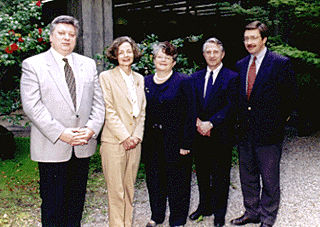![[Currents header graphic]](http://www.ucsc.edu/homeart/currents_header.gif)
May 4, 1998
![[Currents header graphic]](http://www.ucsc.edu/homeart/currents_header.gif)
May 4, 1998

|
|
The Russian delegation met with Chancellor Greenwood and UCSC Ombudsman Sheila Gottehrer during their UCSC visit.
|
UCSC Ombudsman Sheila Gottehrer hosted three members of a Russian delegation on campus last week, as part of a study tour to gather information about how ombudsman's offices work.
The delegation is planning to establish an ombudsman's office at Moscow University for International Relations (MGIMO), which trains diplomats for Russia's foreign service and for other countries of the former Soviet Union. The office, which will help protect the rights of the university's students, faculty, and staff, will be the first of its kind in the Russian Federation.
It is hoped that the pilot project will plant seeds for additional offices at other Russian universities, said Alexander Avanessov of the United Nations Development Programme (UNDP), which is working with MGIMO on the project.
"There is a lot of action in Russia around the issue of human rights, but it is patchy, and there are a lot of shades from the past," said Avanessov during his UCSC visit. "We are trying to promote human rights through the grassroots level--through the students, the future leaders of our country. It is a real attempt to show the concept of human rights at work in real terms."
While at UCSC on Thursday, April 30, Avanessov and other delegation members met with Chancellor Greenwood, Assistant Chancellor for Human Resources Julia Armstrong-Zwart (UCSC's first ombudsman), and Executive Assistant to the Chancellor Leslie Sunell. They also met with representatives of UC, University Extension, and UCSC about possibilities for future collaborations between the university, MGIMO, and UNDP.
Gottehrer, Avanessov, MGIMO Rector Anatoly Torkunov, and future MGIMO ombudsman Oleg Ultsiferov traveled to UC Berkeley Thursday night. On Monday, Gottehrer and Ultsiferov returned to UCSC for a two-day training while the others traveled to New York and later returned to Moscow.
Gottehrer and Ultsiferov will travel to Los Angeles and Montreal to visit the ombudsmen of the California Institute of Technology, UCLA, and Canada's Concordia University and the Universite de Montreal during the 11-day training/study tour.
"We are starting from the zero point, and the assistance of this university and the ombudsman here is very essential," said Ultsiferov. "We are making our first steps and need to know every detail of this."
MGIMO is planning to arrange seminars and conferences with people from other Russian Federation universities to help them establish offices at their own institutions, said Torkunov.
"In talks with other universities, I know that many have a keen interest in such an activity," he added. "This is important for the whole institution of human rights in my country and particularly in the higher education system."
Gottehrer said she is "elated and excited" to help MGIMO establish an ombudsman's office. "It is a big step, because the office will provide ways for people to deal with issues involving human rights and the protection of human rights," she said.
Gottehrer has worked on this project since its beginnings: At the invitation of the United Nations Development Programme in 1996, she participated in an international delegation that assessed the needs in the Russian Federation for human-rights related projects. One of the delegation's recommendations was that a university ombudsman's office be founded in the federation.
In December 1997, Gottehrer participated in a document-signing ceremony in Moscow that established the pilot program.